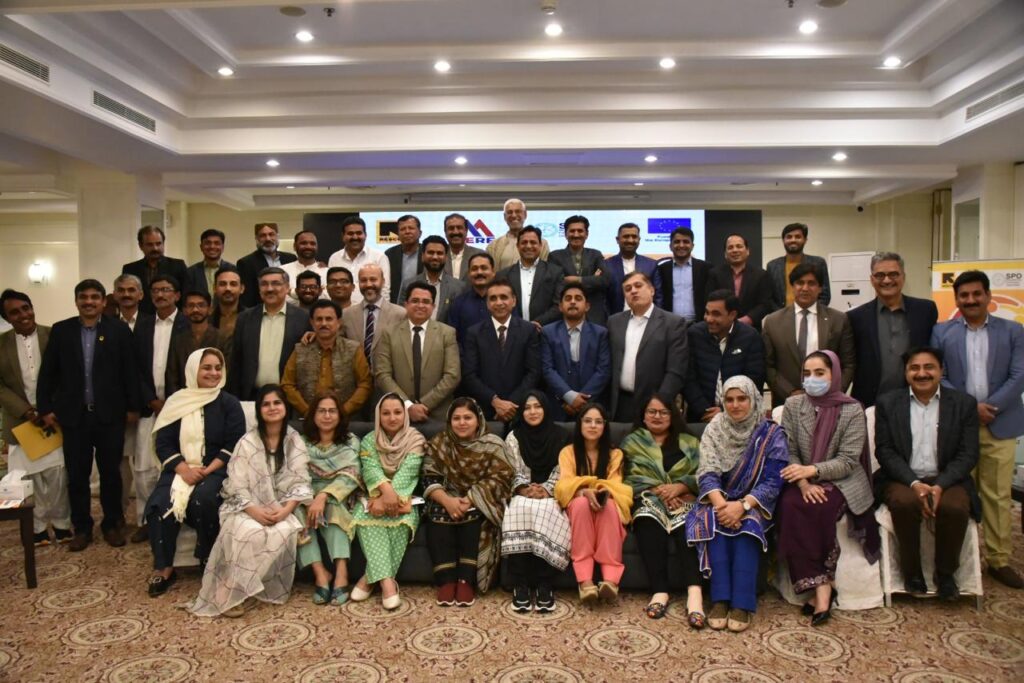
Islamabad , A two-day networking event under the theme “Strengthening Partnerships for Nutrition Solutions” was organised in Islamabad with the support of the European Union. The Networking event brought together experts and key stakeholders and practitioners from government departments, and International, and local Civil Society Organizations, donors and networks to deliberate upon challenges, share experiences and explore innovations, in combating malnutrition in Pakistan. The event was led by the International Rescue Committee (IRC) in collaboration with Strengthening Participatory Organization (SPO) and Medical Emergency Resilience Foundation (MERF).
Organised in the frame of the Project “Strengthening Local Civil Society and Community-based Organizations and their Capacity in the Nutrition Sector in Sindh” funded by the European Union (EU) with the aim of fostering collaboration and learning, the event provided a platform for 15 CSOs for networking opportunities to build partnerships with government entities, donors and international organizations.
Speaking at the event, Ms Barbara Riksen, Head of Section for Rural Development and Economic Cooperation at the EU delegation to Pakistan, noted that “In Pakistan, nearly 10 million children, suffer from stunting. These statistics are not just numbers as they represent millions of lives impacted by inadequate nutrition”. She further noted that the European Union has been actively engaged in the nutrition sector in Sindh for over a decade. In this context, CSOs are uniquely positioned to bridge the gap by bringing essential services closer to the communities. By strengthening these partnerships, we can ensure that community voices are heard, and their nutritional needs are addressed.
The European Union emphasises promoting civil society participation in domestic policies and deepening partnerships with stakeholders globally, including through public-private partnerships.
Lubna Javid, Deputy Director Programs at IRC, reflected on the need for community-driven solutions and said, “Malnutrition is a complex issue that requires not only technical interventions but also the engagement of local communities. Our work highlights the importance of grassroots involvement in tackling this crisis and ensuring sustainable improvements in health outcomes.”
Hisham Mazhar, Project Director, Accelerated Action Plan (AAP) Task Force, highlighted the initiative’s achievements and Sindh government’s support, noting that “The EU-funded CSO strengthening initiative aligns with AAP multi-sectoral plan for improved nutrition. Local CSOs are vital in our collective fight against malnutrition.”
Mubarak Ali Sarwar, representative of SUNCSA, presented an institutional overview of the alliance initiatives and noted that while significant progress has been made, however concentrated efforts are needed to address the gaps pertaining to nutrition policy implementation.
The event also featured an insightful panel discussion on Strengthening Collaboration among CSOs, Government, and Development Partners with esteemed speakers, such as Riaz Hussain (COO, PPHI), Dr Farhana Shahid (Gates Foundation), Dawar Adnan Shams (Rep SUNCSA), and Ihtesham Akram (Advocacy expert). The discussions and insights were centric to bridging the gaps between policy implementation, exploring local solutions and fostering collaboration between Government, donors and CSO’s.
There was an overarching consensus among panelists that in the wake of adverse climate we need to introspect upon nutrition programming and look beyond screening of children, provision of supplies and health facility management. To break the vicious cycle of acute malnutrition we need to address the underlying causes of multi-dimensional poverty, water & sanitation, birth spacing and education.
In a subsequent session the representatives of CSOs and media influencers shared their learnings from the field and noted that the impact of malnutrition goes beyond individual suffering, affecting economic growth, human capital, and straining the healthcare system.
Dr Mahesh Kumar Malani (Chairman Standing Committee Health) in his closing remarks stated that CBOs can also play a significant role in service delivery. They can serve as intermediaries, helping to bring healthcare, nutrition and sanitation services closer to the communities.
In Pakistan, the European Union’s support to nutrition commenced with humanitarian assistance after the 2010 floods. Since 2013 this assistance has taken a long‐term and sustainable perspective by assisting public departments and local organizations to deliver nutrition services, within a clear and efficient policy framework. Through the EU supported SIGN project, IRC, MERF and SPO are reinforcing the capacity of 15 local organizations through technical and financial support to foster policy dialogues aimed at informing policy makers with evidence-based findings to shape policies that ultimately improve health and nutrition service delivery for the most deserving communities.